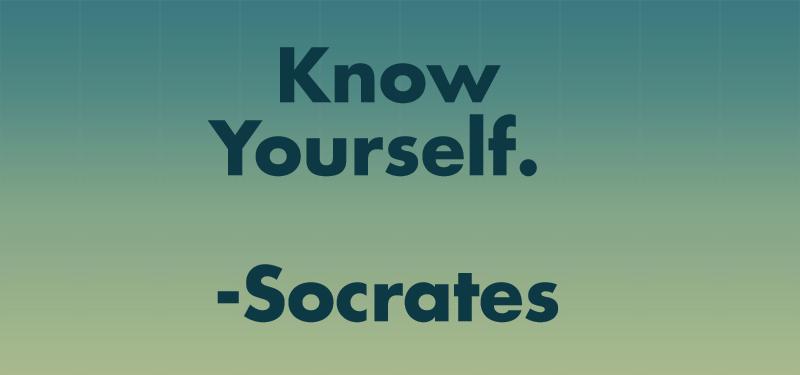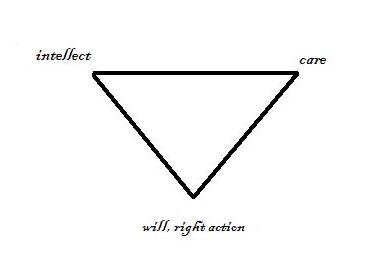Common sense ethics is my term for the straightforward understanding of shared ethical principles which humanity already has, that we have had for a long time. Common sense ethical principles are based on the lessons of daily living, as well as thousands of years of Eastern and Western philosophy, history and religion.
At a fundamental level, we already know what is right, and we have known it for a long time. However, humanity has an unfortunate tendency to become amoral (unconcerned with morality) based on the pressures of conformity and thoughtlessness.
Specifically, we become amoral when we lack guidance during our upbringing, when do not have the basic mental framework and critical thinking skills needed to understand ethics, when we do not care about ethics, when we want to ignore what is right in order to pursue personal gain, and when we do not take the time for reflection and introspection because of pressing personal concerns.
Yet we cannot afford to neglect ethics any longer. Without ethics, life is even more difficult for everyone. We cause harm to others, and we are forced to endure the harm that they cause us. We desperately need to be reacquainted with the ethical principles that we already understand. The state of the world is proof that something is wrong, but this condition can be changed. Ethics are a tool that you can use to change yourself and the world.
Basic Principles:
2. Ethics are universal. The moral principles governing the exercise of individual rights are the same for everyone based on the classical and neo-classical concept of natural law; there are universal moral truths, and these truths derive from nature. This truth has been obscured and confused because of a multitude of competing cultures and creeds, yet it remains the truth nonetheless. Ethics are applicable universally, and should always be applied in a universal way. Ethics do not recognize point of view. If we all have equal rights as human beings, then proper standards of conduct are the same for everyone, like it or not.
If we all have equal rights as humans, then it is not possible for some people to have rights that others do not have. For example, it is not somehow ethical for you to steal, but unethical for me to steal. Groups of individuals also do not posses any rights that individuals do not possess. It is just as unethical for a group to steal or murder as it is for an individual to steal or murder. Therefore:
3. Don’t harm or defraud others. Common sense ethics can be reduced to this simple principle: Don’t harm or defraud others. To do so, is an unethical violation of their rights.
This principle is so simple and is embodied in the Buddhist maxim “Do no harm,” and the Christian maxim, “Do unto others as you would have them do unto you.” The reverse is even more powerful, as Thomas Hobbes pointed out, "Do not that to another, which thou wouldst not have done to thy selfe." Right action based on the do no harm principle, consists of respecting the rights of others through the non initiation of violence, theft, or coercion. Right action can include self defense when someone threatens to forcibly violate your own innate rights.
It is as Immanuel Kant said, “Act only according to that maxim whereby you can at the same time will that it should become a universal law without contradiction. ”
4. Live by ethical principles. Ethics are not just theoretical. They serve as a practical guide to live by. Common sense ethics are based on the principle that all people have equal rights. Actions have consequences, and you alone are answerable to consequences of your behavior. Like the stoics, I argue that the philosophy of common sense ethics should be practiced as a way of life. How can a philosophy not be a way of life? A belief held and not acted upon is a hypocrisy.
Take for example, an academic professor of ethics who is cheating on his wife with a graduate student, who is lying to both his wife and his affair partner. This is a man who spends most of his time contemplating philosophical right and wrong, who really should know better. Yet clearly, he does not apply his knowledge to his own actions. Through his conduct, he will eventually cause suffering for both himself and others, when his wife finds out.
How can you claim to understand ethics if you do not sincerely try to apply them in your life? This type of situation represents someone with an intellectual understanding of ethics only, who does not care enough about ethics to actually apply them, or conveniently ignore what he knows because he is pursuing his own pleasure.
What is the process for becoming a more ethical person?
Putting Common Sense Ethics Into Practice
The way to gain knowledge is to sincerely enjoy learning and not to be impatient of what you don’t understand. You gain intellectual knowledge through the use of reason and the left brain. Through reading, critical thinking, and debate, you become better able to discern truth. You must become a critical and clear thinker in order to understand everything from the Logos to ethics.
Yet someone can be incredibly erudite and educated, and still not ethical. Why?
Because you have to care enough about principles to put ethics into practice in your life, and that takes real work. Care is the second step. You have to care in order to bring about any achievement. Care and the emotional faculty is generally associated with the right brain. To care about ethics is to discipline yourself to do what is right, and refrain from conduct which harms others, every day.
You must care enough to improve self and to build and perfect your character, which was historically the aim of many Eastern and Western schools of thought, from Stoicism to Vedanta.
You must care about building your character enough to learn what you need to learn about yourself. You must do the inner work of looking at any of your unethical actions and correcting them. Introspection is the process of using reason to take a hard look at yourself and unearth any hidden motivators that you have, which is what Socrates meant by “Know thyself.” You can't sabotage yourself if you know how to avoid driving yourself into something that might compromise your integrity.
Right action is the result of unified intention, when both intellectual understanding and care are in accord with ethics. Wisdom is the the result of aligning your intellect and emotions so that you are free of internal contradictions. Through unity of intellect and care, avoid hypocrisy and unethical choices. You understand what is right, and you care about maintaining your integrity enough to do it. Wisdom always asks, “is it right?” before taking any action.











